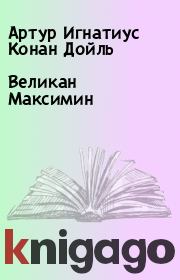Уильям Фолкнер - Collected Stories
 | Название: | Collected Stories |
Автор: | Уильям Фолкнер | |
Жанр: | Классическая проза | |
Изадано в серии: | неизвестно | |
Издательство: | Perfection Learning | |
Год издания: | 2010 | |
ISBN: | 9780756991555 | |
Отзывы: | Комментировать | |
Рейтинг: | ||
Поделись книгой с друзьями! Помощь сайту: донат на оплату сервера | ||
Краткое содержание книги "Collected Stories"
This magisterial collection of short works by Nobel Prize-winning author William Faulkner reminds readers of his ability to compress his epic vision into narratives as hard and wounding as bullets. Among the 42 selections in this book are such classics as “A Bear Hunt, ” “A Rose for Emily,” “Two Soldiers,” and “The Brooch.”
Читаем онлайн "Collected Stories". [Страница - 2]
- 1
- 2
- 3
- 4
- . . .
- последняя (199) »
That night they camped, in a grove of oaks and beeches where a spring ran. The nights were still cool and they had a fire against it, of a rail lifted from a nearby fence and cut into lengths: a small fire, neat, niggard almost, a shrewd fire; such fires were his father’s habit and custom always, even in freezing weather. Older, the boy might have remarked this and wondered why not a big one; why should not a man who had not only seen the waste and extravagance of war, but who had in his blood an inherent voracious prodigality with material not his own, have burned everything in sight? Then he might have gone a step farther and thought that that was the reason: that niggard blaze was the living fruit of nights passed during those four years in the woods hiding from all men, blue or gray, with his strings of horses (captured horses, he called them). And older still, he might have divined the true reason: that the element of fire spoke to some deep mainspring of his father’s being, as the element of steel or of powder spoke to other men, as the one weapon for the preservation of integrity, else breath were not worth the breathing, and hence to be regarded with respect and used with discretion.
But he did not think this now and he had seen those same niggard blazes all his life. He merely ate his supper beside it and was already half asleep over his iron plate when his father called him, and once more he followed the stiff back, the stiff and ruthless limp, up the slope and on to the starlit road where, turning, he could see his father against the stars but without face or depth: a shape black, flat, and bloodless as though cut from tin in the iron folds of the frockcoat which had not been made for him, the voice harsh like tin and without heat like tin: “You were fixing to tell them. You would have told him.”
He didn’t answer. His father struck him with the flat of his hand on the side of the head, hard but without heat, exactly as he had struck the two mules at the store, exactly as he would strike either of them with any stick in order to kill a horse fly, his voice still without heat or anger: “You’re getting to be a man. You got to learn. You got to learn to stick to your own blood or you ain’t going to have any blood to stick to you. Do you think either of them, any man there this morning, would? Don’t you know all they wanted was a chance to get at me because they knew I had them beat? Eh?” Later, twenty years later, he was to tell himself, “If I had said they wanted only truth, justice, he would have hit me again.” But now he said nothing. He was not crying.
He just stood there. “Answer me,” his father said.
“Yes,” he whispered. His father turned.
“Get on to bed. We’ll be there tomorrow.”
Tomorrow they were there. In the early afternoon the wagon stopped before a paintless two-room house identical almost with the dozen others it had stopped before even in the boy’s ten years, and again, as on the other dozen occasions, his mother and aunt got down and began to unload the wagon, although his two sisters and his father and brother had not moved.
“Likely hit ain’t fitten for hawgs,” one of the sisters said.
“Nevertheless, fit it will and you’ll hog it and like it,” his father said. “Get out of them chairs and help your Ma unload.”
The two sisters got down, big, bovine, in a flutter of cheap ribbons; one of them drew from the jumbled wagon bed a battered lantern, the other a worn broom. His father handed the reins to the older son and began to climb stiffly over the wheel. “When they get unloaded, take the team to the barn and feed them.” Then he said, and at first the boy thought he was still speaking to his brother: “Come with me.”
“Me?” he said.
“Yes,” his father said. “You.”
’"Abner,” his mother said. His father paused and looked back the harsh level stare beneath the shaggy, graying, irascible brows.
“I reckon I’ll have a word with the man that aims to begin tomorrow owning me body and soul for the next eight months.”
They went back up the road. A week ago or before last night, that is he would have asked where they were going, but not now. His father had struck him before last night but never before had he paused afterward to explain why; it was as if the blow and the following calm, outrageous voice still rang, repercussed, divulging nothing to him save the terrible handicap of being young, the light weight of his few years, just heavy enough to prevent his soaring free of the world as it seemed to be ordered but not heavy enough to keep him footed solid in it, to resist it and try to change the course of its events. Presently he could see the grove of oaks and cedars and the other flowering trees and shrubs where the house would be, though not the house yet. They walked beside a fence massed with honeysuckle and Cherokee roses and came to a gate swinging open between two brick pillars, and now, beyond a sweep of drive, he saw the house for the first time and at that instant he forgot his father and the terror and despair both, and even when he remembered his father again (who had not stopped) the terror and despair did not return. Because, for all the twelve movings, they had sojourned until now in a poor country, a land of small farms and fields and houses, and he had never seen a house like this before.
Hit’s big as a courthouse he thought quietly, with a surge of peace and joy whose reason he could not have thought into words, being too young for that: They are safe from him. People whose lives are a part of this peace and dignity are beyond his touch, he no more to them than a buzzing wasp: capable of stinging for a little moment but that’s all; the spell of this peace and dignity rendering even the barns and stable and cribs which belong to it impervious to the puny flames he might contrive… this, the peace and joy, ebbing for an instant as he looked again at the stiff black back, the stiff and implacable limp of the figure which was not dwarfed by the house, for the reason that it had never looked big anywhere and which now, against the serene columned backdrop, had more than ever that impervious quality of something cut ruthlessly from tin, depthless, as though, sidewise to the sun, it would cast no shadow. Watching him, the boy remarked the absolutely undeviating course which his father held and saw the stiff foot come squarely down in a pile of fresh droppings where a horse had stood in the drive and which his father could have avoided by a simple change of stride. But it ebbed only for a moment, though he could not have thought this into words either, walking on in the spell of the house, which he could even want but without envy, without sorrow, certainly never with that ravening and jealous rage which unknown to him walked in the ironlike black coat before him: Maybe be will feel it too. Maybe it will even change him now from what maybe he couldn’t help but be.
They crossed the portico. Now he could hear his father’s stiff foot as it came down on the boards with clocklike finality, a sound out of all proportion to the displacement of the body it bore and which was not dwarfed either by the white door before it, as though it had attained to a sort of vicious and ravening minimum not to be dwarfed by anything: the fiat, wide, black hat, the formal coat of broadcloth which had once --">- 1
- 2
- 3
- 4
- . . .
- последняя (199) »
Книги схожие с «Collected Stories» по жанру, серии, автору или названию:
 |
| Уильям Фолкнер - Собрание сочинений в 9 тт. Том 7 Жанр: Классическая проза Год издания: 2001 Серия: У. Фолкнер. Собрание сочинений : в 9 т. |
 |
| Артур Игнатиус Конан Дойль - Великан Максимин Жанр: Классическая проза Год издания: 1998 |
 |
| Чарльз Диккенс - Отдых от столичной суеты Жанр: Классическая проза Год издания: 1960 |
 |
| Ганс Фаллада - Каждый умирает в одиночку Жанр: Классическая проза Год издания: 1948 |
Другие книги автора «Уильям Фолкнер»:
 |
| Уильям Фолкнер - Город Жанр: Классическая проза Год издания: 1965 Серия: Трилогия о Сноупсах |
 |
| Уильям Фолкнер - Весло Жанр: Детектив Год издания: 1993 |
 |
| Уильям Фолкнер, Трумэн Капоте, Эдит Уортон и др. - Американская повесть. Книга 2 Жанр: Классическая проза Год издания: 1991 Серия: Библиотека литературы США |
 |
| Уильям Фолкнер - Шум и ярость - английский и русский параллельные тексты Жанр: Классическая проза Серия: Фолкнер, Уильям. Романы |


